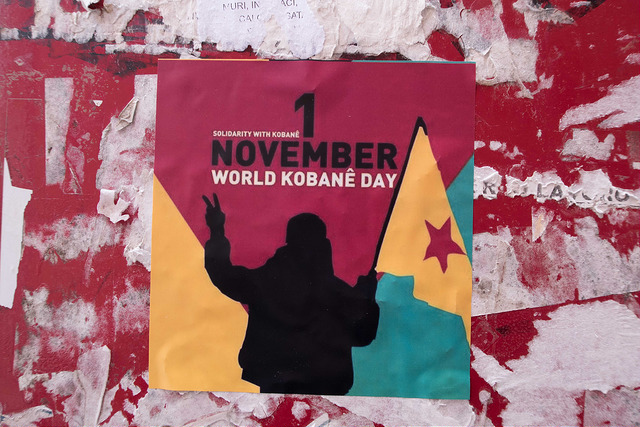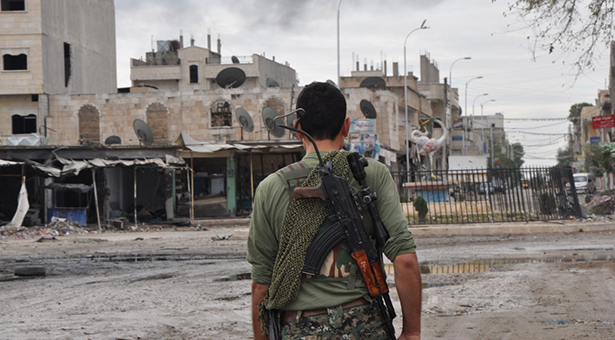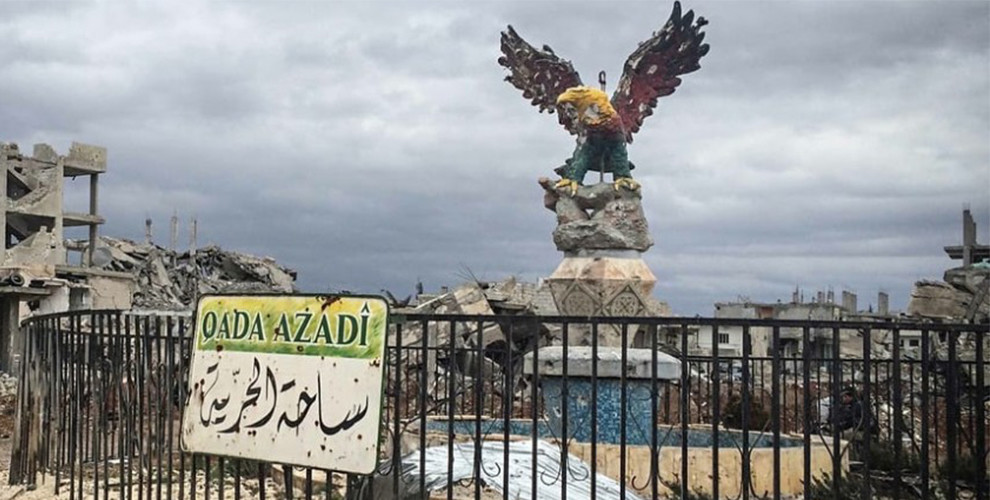Today, 1 November, marks the anniversary of a call for international solidarity with the northern Syrian city of Kobani (Kobanê), a day known as ‘World Kobanê Day’, which commemorates the historic battle waged against the Islamic State (ISIS) siege in the autumn of 2014.
In 2014, Kobani, a predominantly Kurdish town in northern Syria, was besieged by ISIS forces, leading to fierce resistance from local fighters. The town’s plight captured the world’s attention, prompting numerous individuals and organisations to take action.
🔴 World Kobanê Day: Remembering the battle against ISIS and the siege of Kobani (Kobanê).#WorldKobanêDay – #MedyaNewshttps://t.co/ptPwB9I6wK pic.twitter.com/idXGWofS1t
— MedyaNews (@medyanews_) November 2, 2023
Many notable figures, including writers, artists, academics, activists, historians, journalists and lawmakers, joined together to sign a declaration expressing solidarity with Kobanê and calling for humanitarian aid for its beleaguered residents. Demonstrations and rallies took place in many countries as people from all walks of life showed their support for Kobanê’s struggle against the brutal forces of ISIS.
The EU-Turkey Civic Commission (EUTCC) and the Peace in Kurdistan Campaign Initiative played a key role against ISIS by launching a campaign calling for a “Global Rally against ISIS – for Kobanê – for Humanity”. Within the first four days, 130 high-profile individuals from around the world had signed the petition, including luminaries such as linguist Noam Chomsky from the United States, Nobel Peace Prize laureate Adolfo Perez Esquive from Argentina, Nobel Peace Prize laureate Bishop Desmond Tutu from South Africa, and Médecins du Monde President Michel Roland from Belgium. Their collective voice resonated with a call for global action against ISIS in support of Kobani and of humanity.
“If the world wants democracy in the Middle East, it should support the Kurdish resistance in Kobanê. Democratic autonomy in Rojava promises a free future for all the peoples of Syria. In this regard, the ‘Rojava model’ – the secular, non-sectarian, democratic position in Rojava – is the model that practices unity in diversity,” the signatories emphasised in their statement, referring to Rojava, a 35-40 mile strip in northern Syria along the border with Turkey.
On the first World Kobanê Day, 1 November 2014, people around the world responded to this call and took to the streets to express their solidarity with the heroic resistance of Kobanê. This massive, synchronised show of support on that day marked a turning point in the international response to the Kobani crisis.

ISIS attack on Kobani
2010 saw the beginning of the Arab Spring, a series of uprisings in the Arab region, with Tunisia as the epicentre. By March 2011, these uprisings had reached Syria. Here, the Kurdish population in northern Syria adopted a neutral stance, pursuing an alternative path which led to the emergence of the Rojava revolution. The city of Kobani played a key role in the origins of this revolution. On 27 January 2014, Kobani declared its autonomy.
On 8 June Mosul fell to ISIS, and on 3 August, ISIS launched an attack on Sinjar (Şengal). After the withdrawal of the Peshmerga forces affiliated to the Kurdistan Democratic Party (KDP), ISIS perpetrated a massacre, later internationally recognised as genocide, of the Yazidis, for whom Sinjar is the homeland. In September of the same year, ISIS expanded its presence in northern and eastern Syria and launched an attack on Kobani.
On 22 September, Kurdistan Workers’ Party (PKK) leader Abdullah Öcalan, speaking through his lawyer from İmralı prison, warned against the attacks on Kobani, stressing that “the fall of Kobanê means the fall of all Kurdistan. Everyone should act according to this reality.”

Turkey’s refusal to join fight against ISIS
Meanwhile, the Turkish government has long resisted calls to support the fighters in Kobani, arguing that the Democratic Union Party (PYD), which is leading the resistance against ISIS, is linked to the PKK which Turkey considers a terrorist group.
As a NATO member with one of the most powerful military forces in the region, Turkey faced mounting pressure to join an international coalition carrying out air strikes in support of Kurdish fighters against ISIS. But the Turkish government steadfastly refused to participate. Instead, Turkey deployed more than a dozen tanks to defensive positions along the border near Kobani. Ankara also stoked tensions within the Kurdish community by refusing to allow Kurdish fighters from Turkey to cross the border and defend the besieged town.
“Months have passed, but no results have been achieved. Kobani is about to fall,” declared Turkish President Recep Tayyip Erdoğan on 7 October. “I am telling the West. Dropping bombs from the air alone will not bring the desired results. The threat of terror will continue unless we work together for a ground operation,” he added.
On the last day of October, Erdoğan condemned the international focus on Kobani. Turkey’s hostile attitude towards the Kurdish resistance and any solidarity with it remained intact.
The imprisoned former co-chairs of the pro-Kurdish Peoples’ Democratic Party’s (HDP) Selahattin Demirtaş and Figen Yüksekdağ, along with many other senior party officials, face trial for their calls for solidarity with Kobanê in the autumn of 2014, on charges of inciting violence that led to multiple deaths.

Ongoing threat
Though the Battle of Kobani ended in victory for the resistance, the city was only liberated from ISIS in mid-March 2015, after claiming the lives of over 700 fighters from the Women’s Protection Units (YPJ), the People’s Protection Units (YPG) and hundreds of civilians, and leading to the displacement of over 400,000 people. The YPJ and YPG are attached to the security forces of the autonomous region, the Syrian Democratic Forces (SDF).
The Kurdish-majority city continues to face the threat of war today, this time from Turkish forces, whose jets have intensively targeted areas under the control of the Autonomous Administration of North and East Syria (AANES) during the most recent offensive, which began on 5 October. The air strikes have completely destroyed all power stations and most of the region’s oil production facilities, leaving some two million people without electricity and water.
“Kobanê, the city that defeated ISIS, is now under intense and brutal bombardment by Turkish warplanes, as are the Amuda and Dêrik [Al-Malakiyah] areas,” the SDF’s chief press officer Farhad Shami announced as he shared footage of the bombardment on his social media account on 8 October.










